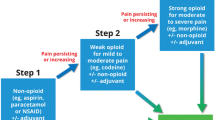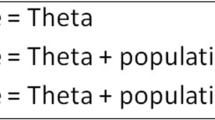Abstract
Pierre-Auguste Renoir was one of the most influential painters in art history, but few people know that he suffered from debilitating rheumatoid arthritis. Despite his arthritis, he was able to maintain an incredible level of precision and efficiency with his painting. More importantly, he remained positive and did not let his condition affect his passion for painting or take away from the beauty that he saw in the world around him. Renoir applied a wide variety of coping mechanisms and used his ingenuity to come up with different ways to continue painting even as his arthritis weakened him. Renoir's long battle with rheumatoid arthritis serves as an inspiration to patients who experience the pain and limited mobility associated with this disease, encouraging them to persevere and to develop coping mechanisms that prevent the effects of their impairment from disabling them.






Similar content being viewed by others
References
Adriani G. Renoir. Cologne: [London]: Dumont; Yale University Press (distributor) 1999; 19, 54.
André A. Renoir. Paris, G. Crès, 1919; 30, 32, 36–39.
Bear-Lehman J. Factors affecting return to work after hand injury. Am J OccupTher. 1983;37:189–94.
Bonnard P. Pierre-Auguste Renoir. Comedia, 1941; 1.
Boonen A, van de Rest J, Dequeker J, et al. How Renoir coped with rheumatoid arthritis. BMJ. 1997;315:1704–8.
Cowart J, Fourcade D. Henri Matisse: the early years in Nice, 1916–1930. New York: H.N. Abrams; 1986. p. 19.
Distel A. Renoir. New York: Abbeville; 2010. p. 209–347.
Englbrecht M, Gossec L, DeLongis A, et al. The impact of coping strategies on mental and physical well-being in patients with rheumatoid arthritis. Semin Arthritis Rheum. 2012;41:545–55.
Florisoone M. Renoir. Paris: [New York]: French and European publications, inc.; The Hyperion press (distributor) 1938; 14.
Gafvels C, Hagerstrom M, Nordmark B, et al. Psychosocial problems among newly diagnosed rheumatoid arthritis patients. ClinRheumatol. 2012;31:521–9.
Geuskens GA, Burdorf A, Hazes JM. Consequences of rheumatoid arthritis for performance of social roles—a literature review. J Rheumatol. 2007;34:1248–60.
Katz PP, Yelin EH. Prevalence and correlates of depressive symptoms among persons with rheumatoid arthritis. J Rheumatol. 1993;20:790–6.
Lazarus RS. Coping theory and research: past, present, and future. Psychosom Med. 1993;55:234–47.
Louie J. Renoir, his art and his arthritis. Brussels: Elsevier; 1987. p. 43–4.
Renoir J. Pierre-Auguste Renoir; monpère. Paris: Gallimard; 1981. p. 1–507.
Rupp I, Boshuizen HC, Roorda LD, et al. Poor and good health outcomes in rheumatoid arthritis: the role of comorbidity. J Rheumatol. 2006;33:1488–95.
Scheier MF, Carver CS. Optimism, coping, and health: assessment and implications of generalized outcome expectancies. Health Psychol. 1985;4:219–47.
Scheier MF, Carver CS. Dispositional optimism and physical well-being: the influence of generalized outcome expectancies on health. J Pers. 1987;55:169–210.
Sinclair VG, Blackburn DS. Adaptive coping with rheumatoid arthritis: the transforming nature of response shift. Chronic Illn. 2008;4:219–30.
Treharne GJ, Kitas GD, Lyons AC, et al. Well-being in rheumatoid arthritis: the effects of disease duration and psychosocial factors. J Health Psychol. 2005;10:457–74.
Treharne GJ, Lyons AC, Booth DA, et al. Psychological well-being across 1 year with rheumatoid arthritis: coping resources as buffers of perceived stress. Br J Health Psychol. 2007;12:323–45.
Zautra AJ, Parrish BP, Van Puymbroeck CM, et al. Depression history, stress, and pain in rheumatoid arthritis patients. J Behav Med. 2007;30:187–97.
Zautra AJ, Smith BW. Depression and reactivity to stress in older women with rheumatoid arthritis and osteoarthritis. Psychosom Med. 2001;63:687–96.
Acknowledgments
This study was supported, in part, by grants from the National Institute on Aging and the National Institute of Arthritis and Musculoskeletal and Skin Diseases (R01 AR062066) and from the National Institute of Arthritis and Musculoskeletal and Skin Diseases (2R01 AR047328-06) and a Midcareer Investigator Award in Patient-Oriented Research (K24 AR053120) (to Dr. Kevin C. Chung).
Author information
Authors and Affiliations
Corresponding author
About this article
Cite this article
Kowalski, E., Chung, K.C. Impairment and disability: Renoir's adaptive coping strategies against rheumatoid arthritis. HAND 7, 357–363 (2012). https://doi.org/10.1007/s11552-012-9467-4
Published:
Issue Date:
DOI: https://doi.org/10.1007/s11552-012-9467-4




